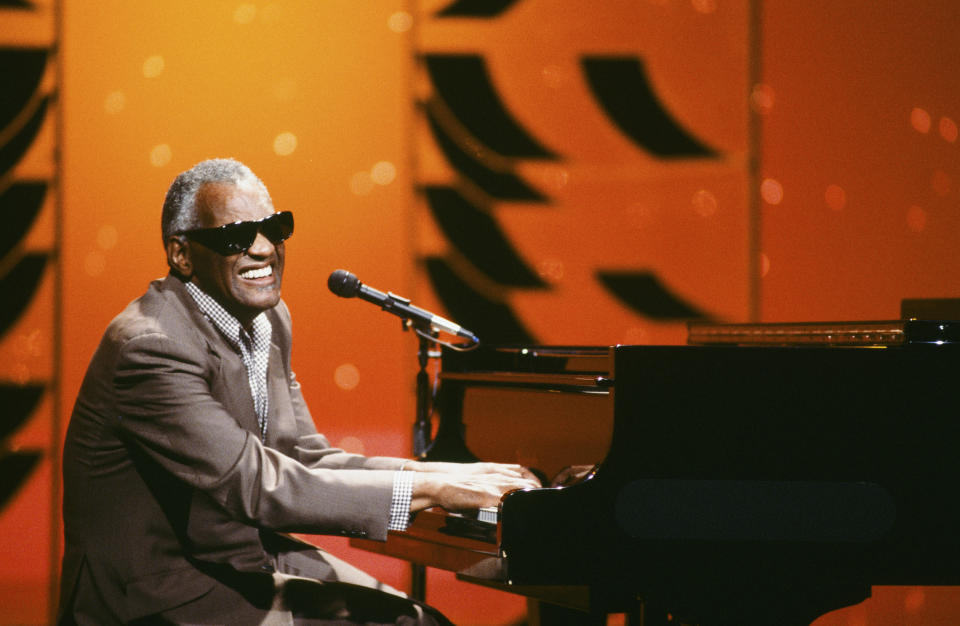“I Can’t Stop Loving You” by Ray Charles is a song that embodies the fusion of soul, country, and pop in a way that only Ray Charles could achieve. Released in 1962 as part of his seminal album “Modern Sounds in Country and Western Music,” the song became a massive hit, reaching number one on the Billboard Hot 100 and the R&B chart. It also dominated the country charts, showcasing Charles’ incredible ability to cross genre boundaries and appeal to a wide audience. “I Can’t Stop Loving You” was not only a commercial success but also a cultural milestone, representing a bold blending of genres that helped bridge racial divides in music.

Originally written by country artist Don Gibson in 1957, the song had already been a hit on the country charts before Ray Charles put his signature spin on it. While Gibson’s version was rooted in classic country balladry, Charles transformed the song into a sweeping, orchestral soul ballad. His version features lush strings, a gospel-like choir, and, of course, his unmistakable voice—rich, emotional, and full of longing. The song became a showcase for Charles’ versatility as an artist and solidified his status as one of the most innovative musicians of his time.
Lyrically, “I Can’t Stop Loving You” is a simple but powerful declaration of undying love. The protagonist is haunted by memories of a past relationship that he can’t move on from. The refrain, “I can’t stop loving you / I’ve made up my mind,” is repeated throughout the song, emphasizing the depth of emotion and the finality of his decision to live with the pain of lost love. The simplicity of the lyrics allows the emotion behind them to shine through, and Charles’ delivery brings them to life with a depth that resonates with anyone who’s experienced heartache.
What makes Ray Charles’ rendition of the song so remarkable is the way he infuses it with a sense of grandeur and drama. The sweeping orchestral arrangement, conducted by Marty Paich, elevates the song from a simple country ballad into something more profound and universal. The use of a full string section gives the song a lush, cinematic quality, while the backing vocals from The Raelettes add a gospel-like sense of spiritual yearning. Together, these elements create a rich, textured sound that complements Charles’ emotional performance.
Charles’ voice is the heart of the song. His ability to convey deep emotion with seemingly effortless grace is on full display here. He moves between tenderness and power, between quiet reflection and passionate outpouring, making the listener feel every bit of the heartache and longing in the lyrics. His phrasing and timing are impeccable, giving each line a sense of weight and meaning. When Charles sings, “Those happy hours that we once knew / Though long ago, still make me blue,” you can hear the pain in his voice as if he’s living the experience in real-time.
The song’s success was a testament to Charles’ genius as an artist who could take a song from one genre and completely reinvent it in his own style. At a time when racial tensions were high in America, Charles’ crossover into country music—a traditionally white genre—was groundbreaking. His album “Modern Sounds in Country and Western Music” was a landmark release, breaking down racial barriers and proving that music could transcend the divisions of race and genre. “I Can’t Stop Loving You” became a symbol of this achievement, showing that country music could resonate with audiences far beyond its traditional base.
Ray Charles’ interpretation of the song also had a lasting influence on future generations of musicians. His ability to blend country, soul, gospel, and pop set a template for genre-bending artists who would follow in his footsteps. His version of “I Can’t Stop Loving You” has been covered by countless artists, but few have been able to match the emotional depth and musical sophistication that Charles brought to the song.
In conclusion, “I Can’t Stop Loving You” by Ray Charles is a masterclass in musical interpretation. His ability to take a simple country song and transform it into a soulful, orchestral masterpiece is a testament to his unparalleled artistry. The song’s emotional power, combined with its genre-crossing appeal, made it a timeless classic that continues to resonate with listeners today. Ray Charles’ version of the song stands as a powerful example of how music can bridge divides and speak to the universal human experience of love, loss, and longing.
🎵 Let’s sing along with the lyrics! 🎤
‘ve made up my mind
To live in memories of the lonesome times
(I can’t stop wanting you)
It’s useless to say
So I’ll just live my life in dreams of yesterday (dreams of yesterday)
Those happy hours that we once knew
Tho’ long ago, they still make me blue
They say that time heals a broken heart
But time has stood still since we’ve been apart
I’ve made up my mind
To live in memories of the lonesome times
(I can’t stop wanting you)
It’s useless to say
So I’ll just live my life in dreams of yesterday
those happy hours
(That we once knew) that we once knew
(Tho’ long ago) tho’ long ago, (still make me blue) still make me blue
(They say that time) they say that time
(Heals a broken heart) heals a broken heart
(But time has stood still) time has stood still
(Since we’ve been apart) since we’ve been apart
I said I’ve made up my mind
To live in memories of the lonesome times
Sing the song, children
(I can’t stop wanting you)
It’s useless to say
So I’ll just live my life of dreams of yesterday (of yesterday)